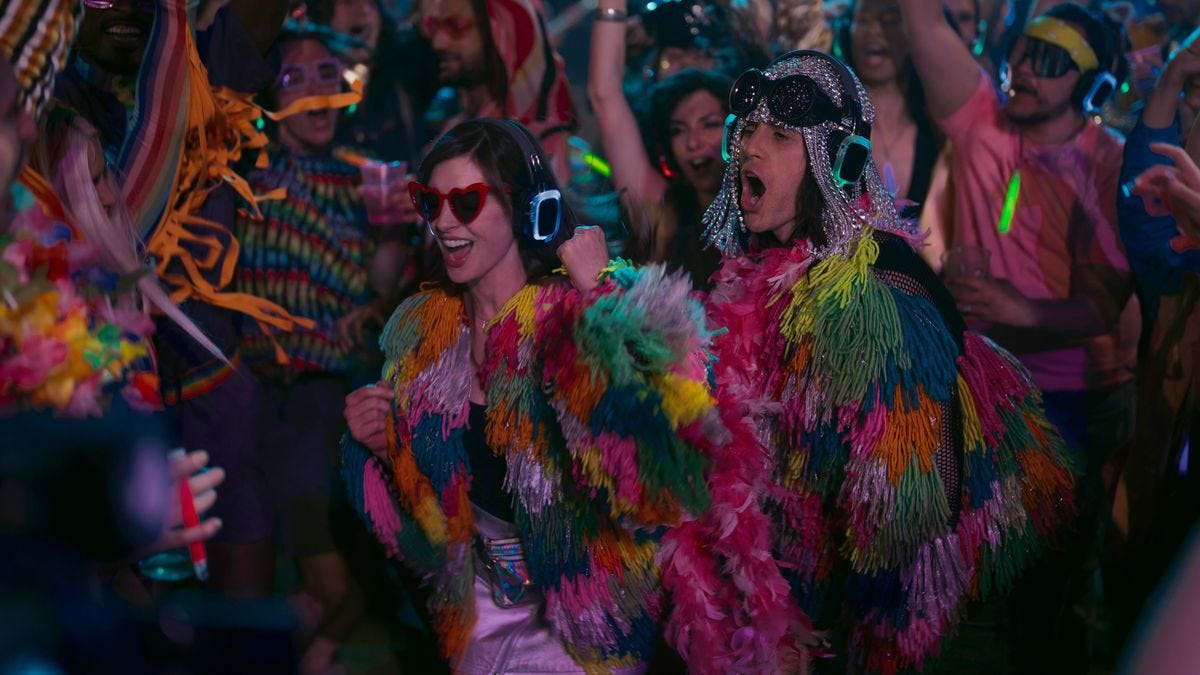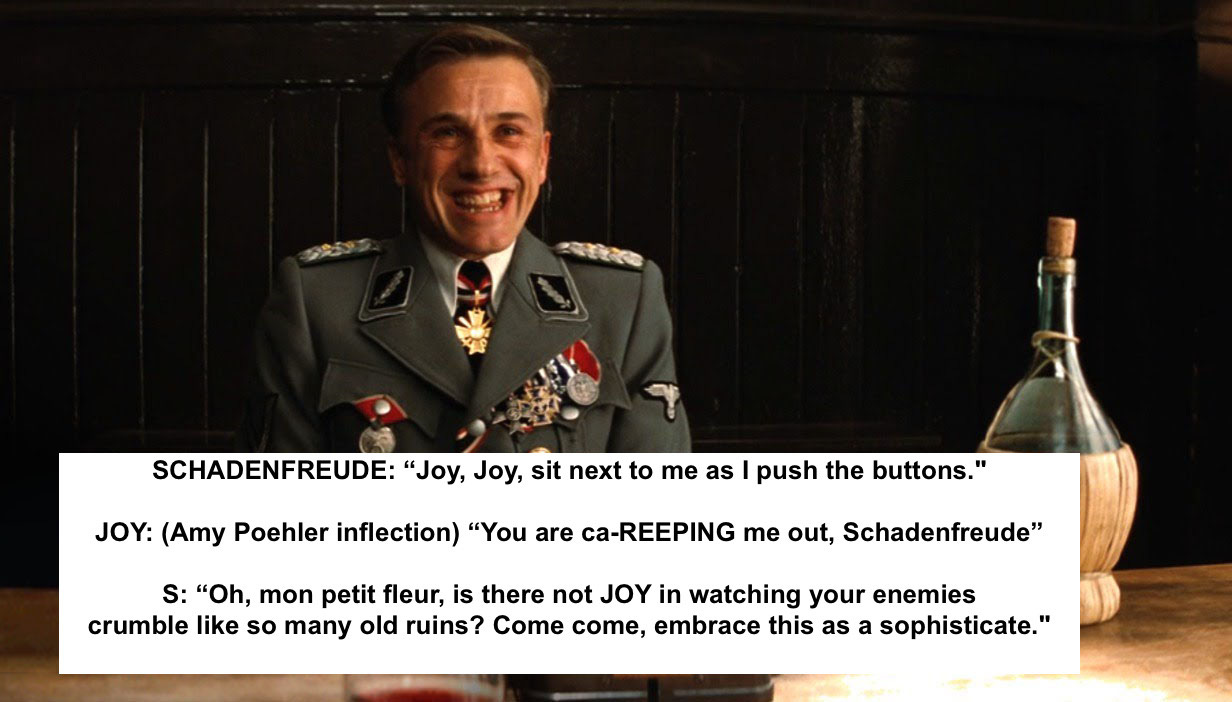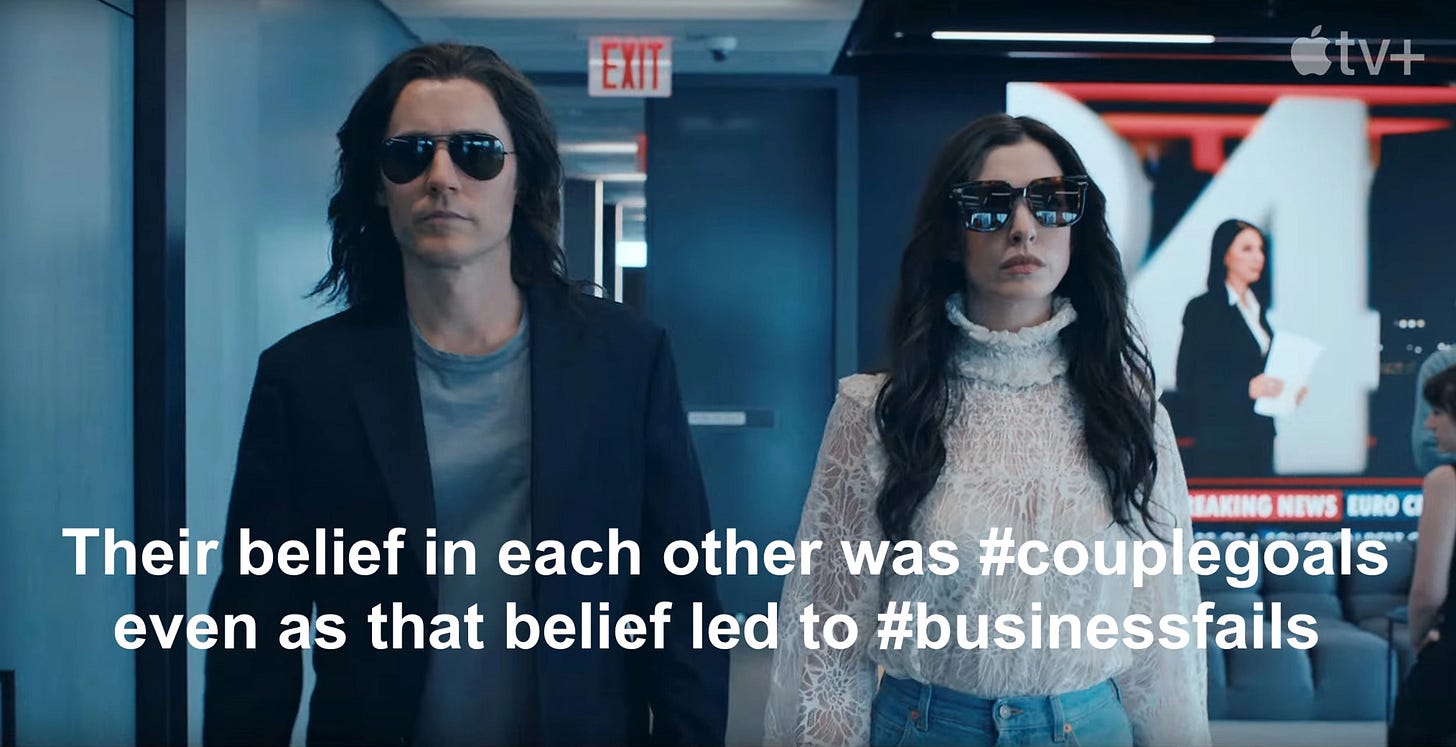'WeCrashed' skirts schadenfreude to elevate this critic's consciousness
Just wanted to get some German in the header
“Have you been watching…?” is the absolute worst way to start a sentence, and I don’t care if it’s with your best friend or some rando you just met at a (digital) party. There is simply too much television to watch, the world is too big and happening too fast, and a reminder of any of this mostly makes us want to relocate to a small Croatian farm, completely off the grid, and finally just reconnect with our bodies, you know?
…Anyway, here’s a TV recommendation for you!
WeCrushing on WeCrash
Did something just happen? Because you better believe there’s currently a limited series dramatically recreating that something somewhere across the stream-o-verse! You know what I’m talking about:
‘Super Pumped’
‘The Dropout’
‘WeCrashed’
‘Inventing Anna’
Maybe you’ve seen a few of these. Maybe you’ve seen all of them, you weirdo! The “why” behind this absolute GLUT of fictionalized true-life miniseries is easy enough to suss out: there’s built-in story familiarity, a definitive ending, and they’re cheaper to produce than probably a single episode of ‘Stranger Things’. We’re only going to get thirteen more when one or several of these projects cleans up at the 2022 Emmys.
Many of these shows are about scammers — the rise and fall of some 21st century Henry Hill swindling a 21st century River City (usually New York or San Francisco). Anna Delvey. Travis Kalanick. Elizabeth Holmes. They’re magnetic, larger-than-life, and we get to enjoy their rise (they’re living embodiments of some kind of warped American Dream!) and fall (I never would have defrauded the public, let alone investors, that way) all from the comfort of our Wayfair couches.
On paper, ‘WeCrashed’ hits those same beats, charting the rise and (well-cushioned) fall of WeWork founder Adam Neumann and his wife Rebekah Neumann, whose collective ambition turned the company into one of the most amazing success stories of the 21st century before absolutely cratering under their myopia and questionable long-term business sense.
The marketing engine behind all these shows, whether stated or not, is a little thing called schadenfreude. We love watching ridiculous, even villainous characters get their comeuppance. We love when someone gets too big for their britches and those britches fight back. We just love being right.
And I’m right there with you! I love schadenfreude. I think it should be one of the new Emotions in ‘Inside Out 2’, and be voiced by Christoph Waltz.
…But it’s also sometimes a lazy crutch, especially for stories we’ve already read or heard (many of these shows are based on podcasts) and already put in their emotional place, so to speak. Of course Elizabeth Holmes is a sociopath. Of course Anna Delvey preyed on our twin obsessions with wealth and status to hide in plain sight. We on our couches have the benefit of time — hell, historical record — to look at these stories the “right” way, with that perfect level of Sorkin-y “well, we know better, don’t we?” smugness. Dunking on the past is the absolute easiest thing in the world, next to posting your “I Voted” sticker!
‘WeCrashed’ works because it’s ultimately not that interested in why WeWork failed, or what this says about 2010’s era tech hubris, or whether Jared Leto can pull off an Israeli accent (sound off in the comments!)… it just wants to know how two straight-up wackos can learn to listen to each other and maybe, just maybe, implode an entire company with the strength of their relationship.
It’s a love story! And the main reason it works — that I’m rooting for these two to bilk investors and achieve their dubious, frankly incoherent vision of “global consciousness” — is Jared Leto and Anne Hathaway. Do the Oscars mean anything? Maybe not. But there’s a reason these two have them, and you can see it in Leto’s spell-casting eyes (even dulled by brown contacts) and hear it in Hathaway’s Brad Garrett x East Hampton x GOOP vocal intonations. Everything these two do here is mesmerizing and turns what easily could have been two walking cartoon characters into people you not only understand, you empathize with. You see what Rebekah saw in Adam, what Adam saw in Rebekah; the ways they each needed the other to do the beautiful/terrible things they’d do.
You know how I know these are great performances? In its very first episode, ‘WeCrashed’ plays Katy Perry’s anthem ‘Roar’, an undeniably great pop song but also shorthand for 2010s-era white feminism (see: Hillary playing it on the 2016 campaign trail). The Neumanns are heading into battle! The future of the company is at stake! The song plays in their apartment, in the Escalade driving them through Manhattan, and finally from the WeWork HQ speakers (an assistant called ahead) as they stride in like New Age Darth Vader and Emperor Palpatine to CLAIM WHAT’S THEIRS.
‘Roar’ pops up regularly throughout the series1, each time shaded more and more by what we learn about Adam and Rebekah. It feels less triumphant each time! Maybe even ironic, or sad. By the time everything implodes in the finale, the song has literally been replaced by an orchestral version:
I guess what I’m trying to say is ‘WeCrashed’, a show I wasn’t even that interested in to start, manages to take a Katy Perry needle-drop and make it feel like fucking Beethoven by the last episode. Did you know that every human emotion could be wrung out of a vague girlboss anthem? It’s honestly the best pop song glow-up since Tony Soprano put “Don’t Stop Believin’” on the jukebox in Holsten’s.
Long story short2: there’s a human center to ‘WeCrashed’, digging past the cartoon headlines to find something loving, or at least empathetic in the Neumanns. I just… believed them, or believed that THEY believed, so when it all comes crashing down for them — as it did, and as it should have — I don’t feel like gloating; I feel like pulling these two nutso lovebirds into a big, consciousness-expanding hug and howling at the moon. That’s good TV!
Adam Neumann really did love the song
I genuinely thought this would be a “quick one”






